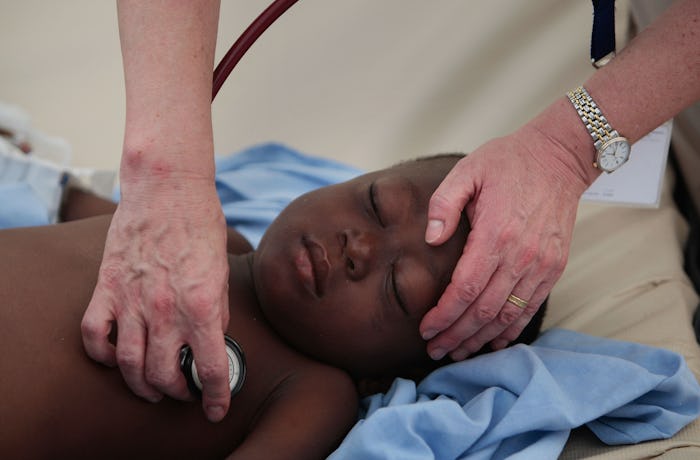Life

Malaria Vaccine Could Save Kids' Lives
Just one day ahead of its World Malaria Day scheduled for Tuesday, the World Health Organization announced that clinical trials for the first-ever malaria vaccine will begin in three of the hardest-hit counties in 2018. Starting then, hundreds of thousands of babies in Ghana, Kenya, and Malawi will be included in the continued testing of the RTS,S vaccine. And, if all goes well, the new malaria vaccine will affect children in the best possible way: By saving tens of thousands of lives when used in conjunction with other, existing preventive measures.
But the RTS,S vaccine, also known as Mosquirix, has a ways to go before achieving that happy outcome. That's because the vaccine must be administered in four doses. Patients get one shot a month for three months in a row, and then a fourth and final one 18 months later, according to BBC News. But limited access to health care in the real world versus in clinical trials can make this a challenge in poor countries that experience high rates of malaria. To determine the feasibility of adding the injectable vaccine to its cache of anti-malaria measures, the WHO will include 750,000 babies between the ages of 5 and 17 months old in high-risk areas of Ghana, Kenya, and Malawi, Reuters reported.
Seventy percent of all deaths from the mosquito-borne illness occur in kids younger than 5, according to the WHO. Most of these cases and deaths happen in sub-Saharan African, which is why researchers are focusing clinical trials on young children in this region.
Even though it marks a major, promising milestone in the ongoing fight to eradicate the disease that killed 429,000 people in 2015, Mosquirix is not 100 percent effective. BBC News reported that previous testing showed the four doses prevent malaria 40 percent of the time in babies in the 5- to 17-month age range — a rate that is much lower, and therefore less impressive, than vaccines for other conditions. Still, instances of severe cases of malaria decreased by one-third and fewer children needed to go to the hospital or get blood transfusions after receiving the vaccine, assuming the trial participants had received the critical fourth dose.
Efforts to stop the spread of malaria — which ultimately affects about 200 million people each year — include employing bed netting and using insecticide against the mosquitoes that carry it, according to ABC News. The WHO's ultimate goal is to obliterate the disease by 2040, and it's already made significant progress: The global malaria rate has dropped 21 percent between 2010 and 2015.
Measures such as insecticide-treated mosquito nets have aided in preventing 663 million cases of malaria in sub-Saharan African since 2001, according to the WHO. On the other hand, 43 percent of people in that region (where 90 percent of all malaria cases manifest) did not have access to either mosquito nets or indoor insecticide in 2015. That same year, one child died from malaria every two minutes.
That makes the progress that is this vaccines so, so necessary as researchers work to make it widely available if it proves in the clinical trials to be practical.